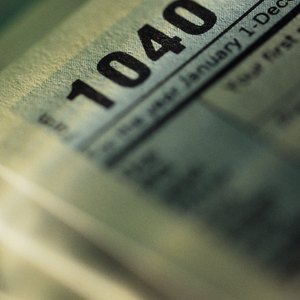
If your income exceeds a specified amount, you must file an income tax return. The amount varies depending on whether you are a dependent, child under 19 or full-time student, self-employed or owe other special taxes. Even if you are not required to file a tax return, you may want to if you qualify for refundable credits or if you have had income taxes withheld from your paycheck so you can get a refund.
General Rules
If you are not claimed as a dependent and are older than 18 (23 if you are a full-time student), your income threshold for filing an income tax return depends on your filing status. For the 2018 tax year, if you are single and under 65, you must file if your income exceeds $10,400. If you are 65 or older, the threshold increases to $11,950. If you are married filing jointly, the threshold is $20,800 if neither spouse is 65 or older, $22,050 if one spouse is 65 or older, and $23,300 if both spouses are 65 or older. Conversely, if you are married filing separately, you must file if your income exceeds $4,050 regardless of your age. For heads of household, the threshold is $13,400 if you are under 65 or $14,950 if you are 65 or older. If you are a qualifying widow or widower with a qualifying child, the threshold is $16,750 if you are under 65 or $18,000 if you are 65 or older.
Dependents
Dependents have significantly lower filing thresholds than people who cannot be claimed as a dependent on another person's tax return because they cannot claim their own exemption. For single dependents under 65 and not blind, the filing threshold is $950 of unearned income, $5,800 of earned income, or gross income in excess of the larger of $950 or earned income plus $5,500. For married dependents, the same rules apply as well as a requirement that the taxpayer file if the taxpayer has at least $5 of income and the taxpayer's spouse files a separate return and itemizes deductions. However, if a child would have to file a return but the child's income comes from only interest and dividends, the parents may elect to include the child's income on their return.
For single dependents age 65 and older or blind, the filing threshold is $2,600 ($4,150 if both) of unearned income, $7,900 ($9,450 if both) of earned income or gross income in excess of the larger of $2,600 ($3,850 if both) or earned income (up to $6,000) plus $3,450 ($3,200 if both). For married dependents age 65 and older or blind, the filing threshold is $2,100 ($3,250 if both) of unearned income, $6,950 ($8,100 if both) of earned income or gross income in excess of the larger of $2,100 ($3,250 if both) or earned income (up to $5,500) plus $1,450 ($2,600 if both). Married dependents over 65 or blind must also file if their income exceeds $5 and the taxpayer's spouse files a separate return and itemizes deductions.
Owing Special Taxes
If you owe special taxes, you have to file an income tax return even if your income does not exceed the filing thresholds. One of the most common special taxes is the self-employment tax. If you have more than $400 of net self-employment income or more than $108.28 of church employee income, you must file a return because you owe self-employment taxes. Other special taxes include Social Security or Medicare tax on tips not reported to your employer or that your employer failed to withhold, additional tax penalties on non-qualified distributions from an IRA, 401k, other pension plan, 529 plan or health savings account. You also must file if you need to repay part of a credit you claimed in a prior year, such as an education credit or the first-time homebuyer credit.
Gross Income
Gross income comprises all of your income that is not exempt from tax. This is most commonly cash, but it also includes any property or services you receive as well. The proceeds from the sale of your primary residence or income from foreign sources must be included in your gross income, even if you can exclude that income on your tax return. If you receive Social Security benefits, you must include the entire amount if you are married filing separately and lived with your spouse at any time during the year. You must include half your Social Security benefits in your gross income if the total benefits plus your other income exceeds $25,000 if you are a single filer or $32,000 if you are a joint filer.
References
- Internal Revenue Service: Publication 17
- Internal Revenue Service: Publication 501
- IRS. "Publication 501 Dependents, Standard Deduction, and Filing Information," Pages 2-5. Accessed March 20, 2020.
- Tax Foundation. "2019 Tax Brackets." Accessed March 20, 2020.
- IRS. "Filing Status," Page 7. Accessed March 20, 2020.
Writer Bio
Based in the Kansas City area, Mike specializes in personal finance and business topics. He has been writing since 2009 and has been published by "Quicken," "TurboTax," and "The Motley Fool."

